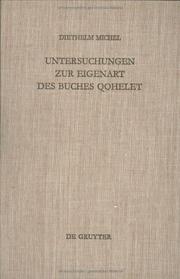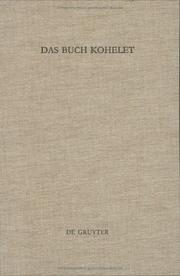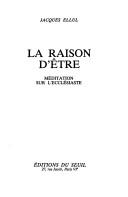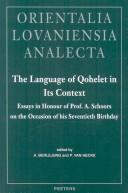| Listing 1 - 10 of 93 | << page >> |
Sort by
|
Book
Year: 2018 Publisher: Berlin ; Boston : De Gruyter,
Abstract | Keywords | Export | Availability | Bookmark
 Loading...
Loading...Choose an application
- Reference Manager
- EndNote
- RefWorks (Direct export to RefWorks)
Der französischsprachige Band bietet eine exegetische und theologische Interpretation von Kohelets Rede über den Reichtum (Koh 5,9-6,6). Die detaillierte exegetische Analyse unterscheidet die existentielle von der anthropologischen und theologischen Bedeutung und arbeitet als ursprüngliche kritische Form der theologischen Rede eine weisheitliche Redefigur heraus, die sich durch zwei Aspekte auszeichnet: entweder die Verneinung Gottes oder den Bezug auf Gott. Dabei wird anhand einer Parallele zum Buch Hiob die Intertextualität der weisheitlichen Rede deutlich. Sofern der literarkritische und hermeneutische Ansatz den Text in seiner kanonischen Endgestalt bevorzugt, weist er unmittelbar auf die innere Spannung des Textes hin, die durch Kontraste geprägt ist, und hinterfragt die Bedingungen des Schreibvorganges. Dieser Ansatz erlaubt auch einen neuen Zugang zum provokanten Denken Kohelets. This French work presents an exegetic and theological interpretation of Qoheleth's speech on riches (Ecclesiastes 5:9-6:6). The detailed exegetic analysis distinguishes the existential meaning from the anthropological and theological meaning, and develops a rhetorical figure of wisdom which is characterised by two aspects - either the denial of God or the reference to God. Using a parallel to the Book of Job, the intertextuality of the discourse of wisdom becomes clear. To the extent that the critical literary and the hermeneutic approach foregrounds the text in its final form, it points directly to the internal tension of the text, which is marked by contrasts, and questions the conditions of the process of composition. This approach also provides a new access to Qoheleth's provocative thinking.
6. --- 9-6. --- Bibel. Kohelet, 5. --- Exegese. --- Bible. --- Criticism, interpretation, etc.

ISBN: 3110121611 311178701X 3110874393 9783110121612 Year: 2013 Volume: 183 Publisher: Berlin ; Boston : De Gruyter,
Abstract | Keywords | Export | Availability | Bookmark
 Loading...
Loading...Choose an application
- Reference Manager
- EndNote
- RefWorks (Direct export to RefWorks)
Bible. Ancien Testament. Ecclésiaste [Livre de l'] --- Bible. Ancien Testament. Qohelet --- Bible. O.T. Ecclesiastes --- Bible. O.T. Qohelet --- Bijbel. Oud Testament. Kohelet --- Bijbel. Oud Testament. Prediker --- Kohelet --- Qohelet --- Bible --- Criticism, interpretation, etc --- 223.5 --- #GROL:SEMI-221<08> Beih 183 --- #GROL:SEMI-223.5 --- #gsdb1 --- Prediker. Qohelet (Ecclesiastes) --- Bible. --- Chŏndo sŏ (Book of the Old Testament) --- Chŏndosŏ (Book of the Old Testament) --- Coheleth (Book of the Old Testament) --- Ecclesiastes (Book of the Old Testament) --- Eclesiastes (Book of the Old Testament) --- Ekklesīast (Book of the Old Testament) --- Ekklēsiastēs (Book of the Old Testament) --- Koheles (Book of the Old Testament) --- Kohelet (Book of the Old Testament) --- Koheleth (Book of the Old Testament) --- Megilat Kohelet (Book of the Old Testament) --- O-que-sabe (Book of the Old Testament) --- Prediger Salomo (Book of the Old Testament) --- Propovednik tsari︠a︡ Solomona (Book of the Old Testament) --- Propovi︠e︡dnik tsari︠a︡ Solomona (Book of the Old Testament) --- Qohelet (Book of the Old Testament) --- Qoheleth (Book of the Old Testament) --- Criticism, interpretation, etc. --- Kohelet. --- RELIGION / Biblical Criticism & Interpretation / Old Testament. --- Exegese Oude Testament --- Wijsheidsliteratuur
Book

ISBN: 1575066920 9781575066929 9781575062655 1575062658 Year: 2021 Publisher: University Park, PA
Abstract | Keywords | Export | Availability | Bookmark
 Loading...
Loading...Choose an application
- Reference Manager
- EndNote
- RefWorks (Direct export to RefWorks)
"Meaningless, meaningless, everything is meaningless." The word "meaningless" (hebel) appears more than 40 times in the book of Ecclesiastes and raises the question why a book that appears to deny meaning or purpose is included in the Bible. Many questions of interpretation as well as relevance surround the book of Ecclesiastes, including indeed the proper translation and understanding of the word hebel. If, after all, the book does examine the question of the meaning of life, what could be more important?The present volume explores Ecclesiastes/Qohelet on many different levels: linguistic, text-critical, theological, historical, and literary. The contributors, chosen from many of the leading and emerging experts on the book, present both the state of the field and their own assessment of the varied interpretive issues of Ecclesiastes. They include scholars, preachers, and philosophers. It should be helpful not only to scholars but also to all who want to study this book seriously.The first section of this volume deals with the history of interpretation. The second section is concerned with issues of history, form, and rhetoric. Section three is about key concepts and passages. The fourth section focuses on the language and grammar of Qohelet. The last section engages practical issues of interpretation. The volume is designed to provide exposure to a variety of readers who seek to engage Qohelet in fresh ways in the twenty-first century-from historians of interpretation to biblical exegetes to linguists to theological students.
Christianity.
---
Christianity
---
Religions
---
Church history
---
Bible.
---
Chŏndo sŏ (Book of the Old Testament)
---
Chŏndosŏ (Book of the Old Testament)
---
Coheleth (Book of the Old Testament)
---
Ecclesiastes (Book of the Old Testament)
---
Eclesiastes (Book of the Old Testament)
---
Ekklesīast (Book of the Old Testament)
---
Ekklēsiastēs (Book of the Old Testament)
---
Koheles (Book of the Old Testament)
---
Kohelet (Book of the Old Testament)
---
Koheleth (Book of the Old Testament)
---
Megilat Kohelet (Book of the Old Testament)
---
O-que-sabe (Book of the Old Testament)
---
Prediger Salomo (Book of the Old Testament)
---
Propovednik tsari︠a︡ Solomona (Book of the Old Testament)
---
Propovi︠e︡dnik tsari︠a︡ Solomona (Book of the Old Testament)
---
Qohelet (Book of the Old Testament)
---
Qoheleth (Book of the Old Testament)
---
Criticism, interpretation, etc.
---
223.5
---
Prediker. Qohelet (Ecclesiastes)
---
Exegese.
---
Kohelet.
---
Ecclesiastes
---
Prediger
---
Koh
---
Eccles
---
Eccle
---
Eccl
---
Ec
---
Qoh
---
Qo
---
Kohelet
---
Qohelet
---
Qoheleth
---
<

ISBN: 3110157578 3110805960 9783110157574 Year: 1997 Volume: 254 Publisher: Berlin De Gruyter
Abstract | Keywords | Export | Availability | Bookmark
 Loading...
Loading...Choose an application
- Reference Manager
- EndNote
- RefWorks (Direct export to RefWorks)
Bible OT. Wisdom books. Ecclesiastes --- 223.5 --- Prediker. Qohelet (Ecclesiastes) --- Bible. O.T. Ecclesiastes --- Criticism, interpretation, etc --- Bible. --- Exegese. --- Kohelet. --- RELIGION / Biblical Criticism & Interpretation / Old Testament. --- Chŏndo sŏ (Book of the Old Testament) --- Chŏndosŏ (Book of the Old Testament) --- Coheleth (Book of the Old Testament) --- Ecclesiastes (Book of the Old Testament) --- Eclesiastes (Book of the Old Testament) --- Ekklesīast (Book of the Old Testament) --- Ekklēsiastēs (Book of the Old Testament) --- Koheles (Book of the Old Testament) --- Kohelet (Book of the Old Testament) --- Koheleth (Book of the Old Testament) --- Megilat Kohelet (Book of the Old Testament) --- O-que-sabe (Book of the Old Testament) --- Prediger Salomo (Book of the Old Testament) --- Propovednik tsari︠a︡ Solomona (Book of the Old Testament) --- Propovi︠e︡dnik tsari︠a︡ Solomona (Book of the Old Testament) --- Qohelet (Book of the Old Testament) --- Qoheleth (Book of the Old Testament)
Book
ISBN: 128260239X 9786612602399 9047443314 9789047443315 9789004167179 900416717X Year: 2008 Publisher: Leiden Boston Brill
Abstract | Keywords | Export | Availability | Bookmark
 Loading...
Loading...Choose an application
- Reference Manager
- EndNote
- RefWorks (Direct export to RefWorks)
This study deals with the question of happiness in the book of Qoheleth, starting with the contemporary debate among modern writers concerning the status of various encouraging statements that emerge out of a general context in which “all is vanity”. The first part of this study describes the current position of research, examining the debated questions. The second part proposes an exegetical and contextual inquiry of the words for happiness, drawn up by these authors. The third part suggests a way of resolving the enigma of happiness, based upon an additional formula of happiness, located at the beginning of the second half of the book. Gradually, a conviction takes shape: happiness does not have the same status in the two parts of the book. If, at first, happiness is presented as the only alternative given by God to help man to hold on when faced with the fleetingness of things in life, it later becomes an art of living, apt to be taught to future generations.
Glück
Book
ISBN: 9782130578147 2130578144 Year: 2011 Publisher: Paris : Presses universitaires de France,
Abstract | Keywords | Export | Availability | Bookmark
 Loading...
Loading...Choose an application
- Reference Manager
- EndNote
- RefWorks (Direct export to RefWorks)
Philosophy and literature. --- Philosophie et littérature --- Bible --- Criticism, interpretation, etc. --- In literature. --- Influence. --- French literature --- History and criticism --- Bible. --- In literature --- Literatur. --- Motiv. --- Französisch. --- Rezeption. --- French literature. --- Literature. --- Bible in French literature --- Ecclesiastes --- Critical essays --- Kohelet. --- Bibel. --- Sirach --- Critical essays. --- Literature --- Philosophie et littérature --- Philosophy. --- Dans la littérature. --- Dans la littérature.
Book
ISBN: 157506863X 9781575068633 9781575062815 157506281X Year: 2013 Publisher: Winona Lake Eisenbrauns
Abstract | Keywords | Export | Availability | Bookmark
 Loading...
Loading...Choose an application
- Reference Manager
- EndNote
- RefWorks (Direct export to RefWorks)
Readers of texts come from all generations, from different contexts and with different agendas. This book gives a sample of what both ancient and contemporary readers have brought to the book of Ecclesiastes in the quest for illumination of the text and for their own enlightenment, often furnishing their own agenda. Debates over meaning are formed, shaped, and illuminated by the interpreters themselves. Part One looks at ancient interpreters and at their methods of approaching the text. Jewish and Christian interpreters alike sought to find meaning amongst some of the key puzzles of the book: why does the author call himself 'the son of David' and appear to be Solomon when his pen name also seems to be Qoheleth? Why the contradictions in content? How did such an unorthodox book come to be canonized? How did the dualistic contemptus mundi interpretation of the vanity theme perpetuated by Jerome and others come to hold the field for so long? And how did Luther and the reformers seek to rectify that approach? These questions and others are addressed in this book, looking through the lens of past interpretation. Part Two acknowledges our increasing self-awareness of the importance of method in approaching biblical texts and turns to a sample of modern interpretations from familiar reading groups such as the ecologist, the animal theologian, the liberationist, the post-colonialist, and the feminist. It will be seen that different modern approaches often enlighten the interpretation of specific verses within Ecclesiastes and hence that no one method is a wholesale 'solution' to interpretive concerns. -- Publisher.
Apologetics.
---
Apologetics
---
Apologetics, Missionary
---
Christian evidences
---
Christianity
---
Evidences, Christian
---
Evidences of Christianity
---
Fundamental theology
---
Polemics (Theology)
---
Theology, Fundamental
---
Religious thought
---
Theology
---
Evidences
---
Bible.
---
Chŏndo sŏ (Book of the Old Testament)
---
Chŏndosŏ (Book of the Old Testament)
---
Coheleth (Book of the Old Testament)
---
Ecclesiastes (Book of the Old Testament)
---
Eclesiastes (Book of the Old Testament)
---
Ekklesīast (Book of the Old Testament)
---
Ekklēsiastēs (Book of the Old Testament)
---
Koheles (Book of the Old Testament)
---
Kohelet (Book of the Old Testament)
---
Koheleth (Book of the Old Testament)
---
Megilat Kohelet (Book of the Old Testament)
---
O-que-sabe (Book of the Old Testament)
---
Prediger Salomo (Book of the Old Testament)
---
Propovednik tsari︠a︡ Solomona (Book of the Old Testament)
---
Propovi︠e︡dnik tsari︠a︡ Solomona (Book of the Old Testament)
---
Qohelet (Book of the Old Testament)
---
Qoheleth (Book of the Old Testament)
---
Criticism, interpretation, etc.
---
223.5
---
Prediker. Qohelet (Ecclesiastes)
---
Hermeneutik
---
Exegese
---
RELIGION
---
Religion, Primitive
---
Atheism
---
Irreligion
---
Religions
---
Biblical Studies
---
Wisdom Literature.
---
Old Testament.
---
Bibel
---
Ecclesiastes
---
Prediger
---
Koh
---
Eccles
---
Eccle
---
Eccl
---
Ec
---
Qoh
---
Qo
---
Kohelet
---
Qohelet
---
Qoheleth
---
<

ISBN: 2020094452 9782020094450 Year: 1987 Publisher: Paris Seuil
Abstract | Keywords | Export | Availability | Bookmark
 Loading...
Loading...Choose an application
- Reference Manager
- EndNote
- RefWorks (Direct export to RefWorks)
Christian spirituality --- Bible. --- Criticism, interpretation, etc. --- Criticism, interpretation, etc --- 223.5 --- Prediker. Qohelet (Ecclesiastes) --- Chŏndo sŏ (Book of the Old Testament) --- Chŏndosŏ (Book of the Old Testament) --- Coheleth (Book of the Old Testament) --- Ecclesiastes (Book of the Old Testament) --- Eclesiastes (Book of the Old Testament) --- Ekklesīast (Book of the Old Testament) --- Ekklēsiastēs (Book of the Old Testament) --- Koheles (Book of the Old Testament) --- Kohelet (Book of the Old Testament) --- Koheleth (Book of the Old Testament) --- Megilat Kohelet (Book of the Old Testament) --- O-que-sabe (Book of the Old Testament) --- Prediger Salomo (Book of the Old Testament) --- Propovednik tsari︠a︡ Solomona (Book of the Old Testament) --- Propovi︠e︡dnik tsari︠a︡ Solomona (Book of the Old Testament) --- Qohelet (Book of the Old Testament) --- Qoheleth (Book of the Old Testament) --- Exegese Oude Testament --- Wijsheidsliteratuur

ISBN: 9789042919105 9042919108 Year: 2007 Volume: 164 Publisher: Leuven Peeters
Abstract | Keywords | Export | Availability | Bookmark
 Loading...
Loading...Choose an application
- Reference Manager
- EndNote
- RefWorks (Direct export to RefWorks)
Bible OT. Wisdom books. Ecclesiastes --- Hebrew language --- Hébreu (Langue) --- Grammar. --- Grammaire --- Bible. --- Language, style. --- Langue. --- Style. --- Academic collection --- Festschrift - Libri Amicorum --- Hébreu (Langue) --- Hebrew --- Language studies --- Grammar --- Chŏndo sŏ (Book of the Old Testament) --- Chŏndosŏ (Book of the Old Testament) --- Coheleth (Book of the Old Testament) --- Ecclesiastes (Book of the Old Testament) --- Eclesiastes (Book of the Old Testament) --- Ekklesīast (Book of the Old Testament) --- Ekklēsiastēs (Book of the Old Testament) --- Koheles (Book of the Old Testament) --- Kohelet (Book of the Old Testament) --- Koheleth (Book of the Old Testament) --- Megilat Kohelet (Book of the Old Testament) --- O-que-sabe (Book of the Old Testament) --- Prediger Salomo (Book of the Old Testament) --- Propovednik tsari︠a︡ Solomona (Book of the Old Testament) --- Propovi︠e︡dnik tsari︠a︡ Solomona (Book of the Old Testament) --- Qohelet (Book of the Old Testament) --- Qoheleth (Book of the Old Testament) --- Schoors, Antoon --- Bible. O.T. Ecclesiastes --- Language, style --- Congresses
Book
ISSN: 07501919 ISBN: 9782204096089 2204096083 Year: 2012 Volume: 249 Publisher: Paris Cerf
Abstract | Keywords | Export | Availability | Bookmark
 Loading...
Loading...Choose an application
- Reference Manager
- EndNote
- RefWorks (Direct export to RefWorks)
Bible OT. Wisdom books. Ecclesiastes --- Bible. --- Criticism, interpretation, etc. --- Bible --- Criticism, interpretation, etc --- 223.5 --- Prediker. Qohelet (Ecclesiastes) --- Biblia VT. Libri didactici. Ecclesiastes --- Chŏndo sŏ (Book of the Old Testament) --- Chŏndosŏ (Book of the Old Testament) --- Coheleth (Book of the Old Testament) --- Ecclesiastes (Book of the Old Testament) --- Eclesiastes (Book of the Old Testament) --- Ekklesīast (Book of the Old Testament) --- Ekklēsiastēs (Book of the Old Testament) --- Koheles (Book of the Old Testament) --- Kohelet (Book of the Old Testament) --- Koheleth (Book of the Old Testament) --- Megilat Kohelet (Book of the Old Testament) --- O-que-sabe (Book of the Old Testament) --- Prediger Salomo (Book of the Old Testament) --- Propovednik tsari︠a︡ Solomona (Book of the Old Testament) --- Propovi︠e︡dnik tsari︠a︡ Solomona (Book of the Old Testament) --- Qohelet (Book of the Old Testament) --- Qoheleth (Book of the Old Testament) --- 2235 --- Prediker Qohelet (Ecclesiastes).
| Listing 1 - 10 of 93 | << page >> |
Sort by
|

 Search
Search Feedback
Feedback About UniCat
About UniCat  Help
Help News
News